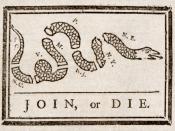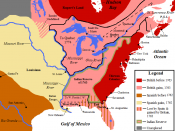A war is always a devastating component for any nation or people involved. This is true for the Indians of the Eastern Woodlands. The Indians were forced to choose sides during both the Seven Years' War and the American Revolution. Different Indian tribes even split up due to this fact. "Some tribes split into factions over issues of peace, war, and alliance with competing European powers" (Calloway, 152). However, neither the Seven Years' War nor the American Revolution brought about any freedom or rights to the Indians.
As part of the Seven Years' War, the French and Indian War had the Indians "fighting on both sides beside European armies, as well as fighting against European armies invading Indian country" (Calloway, 145). The Indians were being pushed and pulled to all different sides for all different reasons. Unfortunately, Britain won the Seven Years' War leaving the Indians to a small amount of nothing.
"Many British officials regarded the Indians as a defeated people and , with the war won, saw little reason to drain a depleted treasury by giving them gifts" (Calloway, 155). One of the British commanders even sent out smallpox infected blankets to the Indians.
Furthermore, after the war had ended the Indians lost much of their already settled land to the English settlers. This brought about even more conflict for the Indians. This is what brought about the American Revolution. Due to the fact that the Indians knew that this "war was a contest for Indian land as well as for American independence" (Calloway, 158), most of the Indians sided with the British in hopes to regain their land and freedom. Unfortunately, this was not the case. "The Revolution brought both suffering and civil war to Indian country" (Calloway, 158).
As was the case for the Indians...


